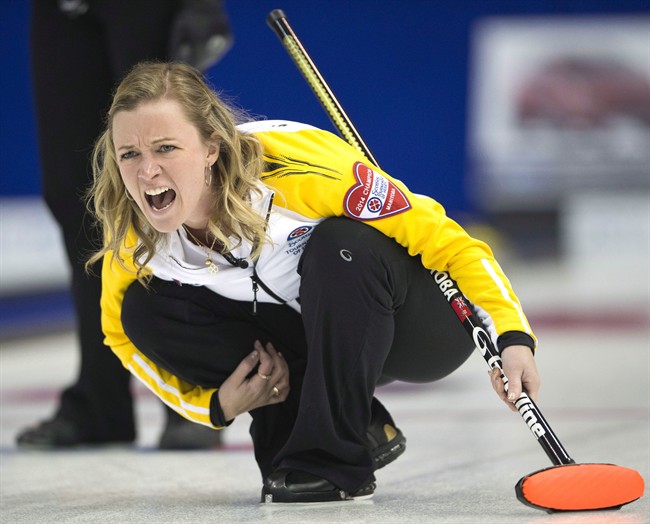CALGARY – Curling‘s sweeping saga is heating up again ahead of the men’s and women’s Canadian curling championships.

The Frankenbroom controversy of 2015 has sprouted a second head on the eve of curling’s marquee events and could create tension between teams.
The World Curling Federation declared a moratorium on broomheads with “directional fabric” in November with Curling Canada following suit. But new issues with currently legal brooms have left curling’s governing bodies with little time to react before the Canadian championships.
The Scotties Tournament of Hearts main draw starts Saturday in Grande Prairie, Alta. The Tim Hortons Brier follows March 5-13 in Ottawa.
Brooms with brushheads featuring “artificially-textured” fabric and hard inserts were banned after almost 50 of the world’s top teams declared they would not use them. The brooms were used to manipulate the trajectory of a thrown rock in unprecedented ways, and curlers were worried they would affect the integrity of the game.
READ MORE: Alberta friends – whose combined age is 340 – still like to hurry hard
But the brooms also spawned a radical directional sweeping technique, with one sweeper sweeping at a time instead of two simultaneously. One sweeper enhances the rock’s curl, while the other sweeper is responsible for making the stone glide straight.
The technique continued after the Frankenbroom ban because sweepers can influence a stone’s movement in the same manner, though to a lesser extent, with “legal” brooms.
Directional sweeping is a trending topic heading into the Scotties and Brier, but another broom brouhaha is brewing.
Brushes made with natural hog or horse hair were introduced to the sport in the 1980s, but have also undergone a recent transformation. They’re now produced with synthetic hairs or a combination of synthetic and natural.

Get daily National news
Hair brushes are legal under the rules and known to be effective in frosty ice conditions. They’re in heavy use again because of directional sweeping.
But there is debate raging in the curling community over whether a hair brush scores the ice with the same intensity as the banned directional fabric and thus impacts a rock’s movement the same way.
It has created bad feelings at some provincial championships in the form of pointed comments and complaining to officials.
“There’s definitely been instances of tension,” Alberta skip Chelsea Carey said. “It’s basically been people disagreeing with hair brooms being legal or kind of taking the stance they already are illegal, which they are not.
“It really kind of puts a damper on what used to be a lot of fun and great camaraderie between teams and opponents and things like that, but now has become a bit contentious in some cases.”
The WCF was pressed into hurry-up mode to study and address the directional fabric issue.
READ MORE: Curling Canada bans brooms with ‘directional fabric’ for upcoming season
Curling Canada’s high-performance director Gerry Peckham says there isn’t enough time for the world governing body to do the same with hair brushes and come up with a policy for its member federations prior to the Scotties, Brier and the men’s and women’s world curling championships.
“How could you ever have anticipated that two different sweeping devices and two different products would both go through a manufacturing transition in such a short period of time, where one wasn’t a viable option for the other?” Peckham asked.
Newfoundland skip and Olympic gold medallist Brad Gushue says testing his team has done proves a hair brush straight out of the box scratches the ice as much as the outlawed directional fabric does. Gushue’s team has posted video of their testing on YouTube.
“A new hair brush has the exact same impact,” Gushue said. “I’m hoping it gets banned before the Brier. It shouldn’t be in play. We have too much control over the rock with those brooms.”

But Gushue says if Glenn Howard’s Ontario team pulls hair brooms out of their curling bags in Ottawa, his team will too.
If that sounds hypocritical, Gushue is not about to give up a competitive advantage to an opponent. The stakes, financial and competitive, are now too high in curling.
There’s $1.5 million to be won in the Grand Slam of Curling, $100,000 in the annual Hot Shots, national and world titles on the line and berths to the Canada Cup, Continental Cup and Olympic trials to be gained.
“You can’t play at a disadvantage,” Gushue said. “We work too hard and spend too much time to allow not obviously just Glenn Howard, but any team that’s there to have an advantage on us.
“We have all kinds of hair heads ready to go.”





Comments